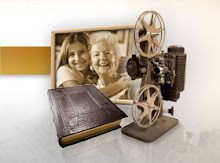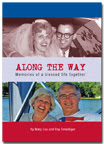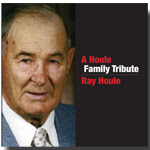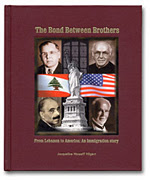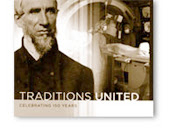"I have some great stories, I just can't remember any of them!"
My friend told me her mom used to say that half jokingly, yet sprinkled with the sadness of regret.
The truth is, each day we allow to pass us by without recording the stories of our past puts those memories at risk of disappearing into the fog that comes with age. So what holds people back? Pride mostly. Most of us are too proud to admit that we are aging or that our memories will fail us one day, so we put off the important task of sharing the stories that others will surely delight in.
What's holding you back?
Wednesday, September 23, 2009
Tuesday, July 21, 2009
Pedigree: In Perspective
Historians tell us that among the useful items the first European colonists brought with them to the New World was one that we might not have suspected: the earthworm. Earthworms didn't occur originally in much of the north, it seems; rather European species were carried here in the colonists' ships, hidden in the soil those vessels loaded as ballast and in the root balls of plants they carried.
Properly reflected on, the idea that a creature as familiar and ubiquitous as the garden worm should be an exotic can do us good. It can enlarge our perceptions of history, including personal history. For consider: If earthworms came to our continent with the colonists, then they necessarily have their places on the same historical timeline as their human importers. Just as the millions of today's descendants of the first European colonists can trace their ancestry to specific people and places, so the descendents of the earthworms who accompanied those pioneers must arrange themselves in a like heirarchy of arrival. Therefore, should you repine that your colonial pedigree isn't all that you might wish, five minutes' work with a garden spade can turn up an aristocrat, a Mayflower worm whose very presence in your vegetable patch must gentle your condition.
-Courtesy of the Farmer's Almanac.
Properly reflected on, the idea that a creature as familiar and ubiquitous as the garden worm should be an exotic can do us good. It can enlarge our perceptions of history, including personal history. For consider: If earthworms came to our continent with the colonists, then they necessarily have their places on the same historical timeline as their human importers. Just as the millions of today's descendants of the first European colonists can trace their ancestry to specific people and places, so the descendents of the earthworms who accompanied those pioneers must arrange themselves in a like heirarchy of arrival. Therefore, should you repine that your colonial pedigree isn't all that you might wish, five minutes' work with a garden spade can turn up an aristocrat, a Mayflower worm whose very presence in your vegetable patch must gentle your condition.
-Courtesy of the Farmer's Almanac.
Thursday, June 12, 2008
A conservator from the Minnesota Historical Society shares some simple things we can do to slow the impact of aging for those precious family keepsakes, including photos. Here a just a few notable ideas:
- First, when you're shopping and see the term "archival" on a scrapbook or frame or album, beware. Archival is a generic, even meaningless term tossed on products for the purpose of sales, much like the label "no added sugar" on food products.
- Public Enemy No. 1 of organic products, meaning paper or textiles (including photos) is ultra-violet light. If you have something you wish to preserve for decades, you need to limit its exposure to light. You can do this by displaying the item in a windowless room, framing it using glass that has a UV filter, or simply storing it in darkness.
- If you have cardboard backing up any precious framed photos, get rid of it right away and replace it with acid-free paper.
- Never use adhesives to mount photos, prints, or anything in a frame. Use photo corners, adhesive mounts (where the adhesive doesn't touch the art) or even corners clipped from an acid-free envelope.
- Always make sure framed artifacts, including photos, don't touch the glass of the frame. Use a window mat or spacers to get a slim cushion of air into the frame. Once an old photo gels up (possible on humid days) and sticks to glass, it's there for good.
- Never laminate photos or documents, but do place brittle papers in polyester film to protect them from further deterioration.
- If you plan to use plastic to protect anything, including photos and slides, look for plastic that is labeled as having NO PVC. If the label isn't clear, put the plastic to your nose. If it has that "plastic" smell, don't use it.
- If, like me, you're fond of storing family treasures in a cedar chest, either line the chest with a acid-free paper, or wrap treasures in a cotton sheet. Don't let the cedar (or any wood product) come into contact with something you wish to preserve.
- If you are a gun collector, keep the old guns and lead bullets out of an oak cabinet. That goes for silver too.
- Last but not least, label the backs of photographs with identification using a dull, No. 2 pencil. Remember, a photo without a name has no value at all!
Tuesday, April 1, 2008
Personal Historians bring value, expertise to the process
When attempting to obtain and preserve a relative’s life story, hiring a personal historian for the task may be your best course of action. Here’s why:
• Family members are often more open when talking to strangers.
• Personal historians are skilled at drawing out reluctant speakers and making them feel comfortable. Also, just knowing that a stranger is interested in hearing a person’s stories encourages him to speak.
• The storyteller will give more details if he knows that the person is hearing the story for the first time. These details can bring the story to life.
• When you interview your own family, you’re going to encounter family secrets, things you may not want to hear. When that happens, you’re going to have a difficult time masking your emotions. Personal historians are non-judgmental and are more skilled in remaining non-emotional and supportive.
• Most people need the motivation, structure, prompting, and encouragement that an experienced personal historian can offer. A personal historian will see the project through to completion and brings expertise in publishing or video production that family members typically don’t have. The result? A family keepsake to be treasured for generations.
• Family members are often more open when talking to strangers.
• Personal historians are skilled at drawing out reluctant speakers and making them feel comfortable. Also, just knowing that a stranger is interested in hearing a person’s stories encourages him to speak.
• The storyteller will give more details if he knows that the person is hearing the story for the first time. These details can bring the story to life.
• When you interview your own family, you’re going to encounter family secrets, things you may not want to hear. When that happens, you’re going to have a difficult time masking your emotions. Personal historians are non-judgmental and are more skilled in remaining non-emotional and supportive.
• Most people need the motivation, structure, prompting, and encouragement that an experienced personal historian can offer. A personal historian will see the project through to completion and brings expertise in publishing or video production that family members typically don’t have. The result? A family keepsake to be treasured for generations.
Monday, March 24, 2008
Tips for interviewing a relative, Part 3 of 3
If a relative is reluctant to agree to be interviewed, here are a few ideas to get things started:
• Ask him or her to confirm or counter what someone else has said.
• Bring out others’ books or tapes as examples of personal history.
• Pull out an old photo album and let the images lead the conversation.
• Reassure your subject that you’ll offer the opportunity to edit the interview transcript before it is shared with anyone.
• When he or she insists that no one would be interested in their life story (They always do!), say everyone’s life is valuable to future generations—the successes and the challenges! An ordinary life, when viewed by descendants, is always extraordinary.
If the person wants to put off being interviewed until a later time, remind him that memories fade with time, and the farther away we get from events, the hazier they become. It’s best to record them now.
• Ask him or her to confirm or counter what someone else has said.
• Bring out others’ books or tapes as examples of personal history.
• Pull out an old photo album and let the images lead the conversation.
• Reassure your subject that you’ll offer the opportunity to edit the interview transcript before it is shared with anyone.
• When he or she insists that no one would be interested in their life story (They always do!), say everyone’s life is valuable to future generations—the successes and the challenges! An ordinary life, when viewed by descendants, is always extraordinary.
If the person wants to put off being interviewed until a later time, remind him that memories fade with time, and the farther away we get from events, the hazier they become. It’s best to record them now.
Monday, March 17, 2008
Tips for interviewing a relative, Part 2 of 3
Family gatherings are often when those all important reminiscences emerge. But capturing stories from a family member during the holidays of family gathering isn’t the most productive way to collect stories. Here are some tips offered by professional personal historians:
• Interview your subject alone in a quiet room of his or her home, away from other people, noisy appliances, ringing phones, and interruptions.
• Use a good tape recorder with a separate microphone, or a quality digital recorder. Test your equipment before going to the interview and periodically throughout. Bring extra batteries. Check the recorded sound level to make sure it’s loud and clear.
• Listen attentively and let the person talk. Don’t interrupt. Give the person time to call up memories. The older the subject, the more pauses you’ll encounter. Wait them out.
• Pay attention and show interest. Don’t rush to the next question. Strive for objectivity, even though that may be difficult. Practice keeping quiet, no matter what the person says.
• Show respect for the person’s integrity and choices even though you may disagree with decisions that were made. Remember, you want to capture the narrator’s story from his or her point of view. Resist the urge to correct, or worse, to judge.
• If a person’s account of an event differs significantly from the historical record, gently say so and ask if that’s how he or she remembers it. Often people honestly don’t remember exact dates or sequences of events or get things mixed up. Gentle questioning can help discover the proper order of events.
• Interview your subject alone in a quiet room of his or her home, away from other people, noisy appliances, ringing phones, and interruptions.
• Use a good tape recorder with a separate microphone, or a quality digital recorder. Test your equipment before going to the interview and periodically throughout. Bring extra batteries. Check the recorded sound level to make sure it’s loud and clear.
• Listen attentively and let the person talk. Don’t interrupt. Give the person time to call up memories. The older the subject, the more pauses you’ll encounter. Wait them out.
• Pay attention and show interest. Don’t rush to the next question. Strive for objectivity, even though that may be difficult. Practice keeping quiet, no matter what the person says.
• Show respect for the person’s integrity and choices even though you may disagree with decisions that were made. Remember, you want to capture the narrator’s story from his or her point of view. Resist the urge to correct, or worse, to judge.
• If a person’s account of an event differs significantly from the historical record, gently say so and ask if that’s how he or she remembers it. Often people honestly don’t remember exact dates or sequences of events or get things mixed up. Gentle questioning can help discover the proper order of events.
Wednesday, March 12, 2008
Tips for interviewing a relative, Part 1 of 3
Before you approach a relative and begin asking questions about his or her life, define your goals and think about some of the following questions:
• Will you focus on the person’s entire life or just a portion of it?
• Who is the audience? In other words, who will have access to this person’s story?
• If negative material comes up, how will you deal with it?
• Will the stories you’re told be published, made available to a select few, or be kept private?
Then, inform the storyteller about the purpose of the interview and who will ultimately hear or read it. If you must, periodically remind the person you are interviewing that the stories that emerge from the interview will only be used in a way you both have agreed upon at the outset.
Once your interview is underway, if your subject refuses to discuss a particular subject, respect his or her wishes and don’t press. Try again at a later date, however; time can change a person’s perspective, giving him or her the distance needed in order to talk about a painful subject.
• Will you focus on the person’s entire life or just a portion of it?
• Who is the audience? In other words, who will have access to this person’s story?
• If negative material comes up, how will you deal with it?
• Will the stories you’re told be published, made available to a select few, or be kept private?
Then, inform the storyteller about the purpose of the interview and who will ultimately hear or read it. If you must, periodically remind the person you are interviewing that the stories that emerge from the interview will only be used in a way you both have agreed upon at the outset.
Once your interview is underway, if your subject refuses to discuss a particular subject, respect his or her wishes and don’t press. Try again at a later date, however; time can change a person’s perspective, giving him or her the distance needed in order to talk about a painful subject.
Subscribe to:
Posts (Atom)
